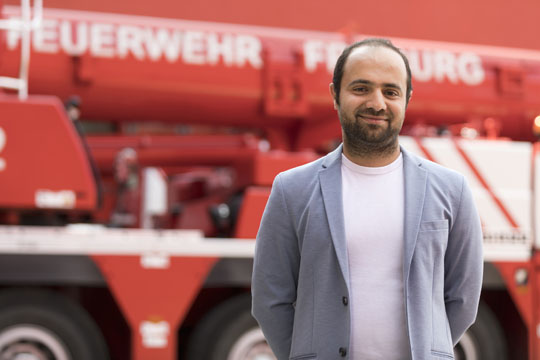In the Event of a Fire
Freiburg, Sep 20, 2018
What should you do when there’s a fire? Osama Makansi has developed a fire safety program that informs refugees about what to do in their accommodation in the event of a fire. Normally, the 28 year-old IT specialist an PhD student is studying at the University of Freiburg how self-driving systems such as cars can learn from pictures. But his involvement with the Denzlingen volunteer fire brigade has also made him decide to train as a firefighter.
 Osama Makansi is active with the volunteer fire brigade and is already planning to train to become a firefighter. Photo: Jürgen Gocke
Osama Makansi is active with the volunteer fire brigade and is already planning to train to become a firefighter. Photo: Jürgen Gocke
It all began by chance. Osama Makansi wanted to help a friend and fellow Syrian, who, through a scholarship program, had accidentally obtained offers to take English studies from two universities – one from Erlangen and one from Freiburg. It was two and a half years ago when the two young men decided to discuss the situation with Wolfgang Hochbruck, professor at the English Department of the University of Freiburg. After all, no one could be in both places at once. While the friend’s problem was quickly resolved, the three continued to sit and chat, and also talked about the many refugees who had crossed the border into Germany in previous weeks. And about a fire safety program on which the English professor, who had been active with the Denzlingen volunteer fire brigade for many years, was working at that time. Today, Hochbruck, the scholar of literature, and Makansi, the IT specialist, are a team. The PhD student has received two awards for his social commitment: in 2018 the German Academic Exchange Service (DAAD) Award for international students, and in 2017 the Freiburg Alumni Award for social commitment.
Osama Makansi is a refugee and yet not a refugee. He comes from Syria; the 28 year-old IT specialist left his home town of Aleppo in 2012, going to Turkey to avoid serving in the military. His family stayed at home. The company he worked for in Turkey for almost three years supplied the technology for passport control machines that use image-processing software to identify whether a pass is valid or not. Makansi subsequently took the issue of how the resolution of videos can be improved as the subject of his thesis. Even when he was in Syria he already knew that he really wanted to become a scientist, says the young man. As he speaks, his hands emphasize his words. So Makansi applied to DAAD from Turkey for the “Leadership for Syria” scholarship program – and was accepted. In 2015 he came to Freiburg and passed his Master’s examination with the grade “very good”. For three months now he has been writing his doctoral thesis. It also looks at image processing and the issue of how self-driving systems such as cars can learn from pictures.
On duty in Denzlingen
And his meeting with Wolfgang Hochbruck? It soon turned into much more, says Makansi. He thought Hochbruck’s idea was thrilling from the start, “The need to explain to refugees in large shelters how to avoid fires and what they should do in the event of a fire, such as calling the right emergency number or the right way to release and use the fire extinguisher. All that sort of thing.” Together, the two men developed a fire safety education program and toured some of the refugee shelters in the Emmendingen district. This not only involved Makansi interpreting into Arabic, but also often explaining what is different in Germany than for example in Syria. And there certainly are differences, “The fire brigade doesn’t always come when you ring them in Syria. Here they do.” Of course, the refugees also had to become involved during the training. Many were very enthusiastic, says Makansi. “Some wanted to join the fire brigade as soon as it was over.”
Osama Makansi, who now lives in Freiburg-Weingarten with his wife, has himself long since joined the Denzlingen volunteer fire brigade. He thinks it is important to lend a hand, and is already planning to train to become a firefighter. And to move to Denzlingen. “I want to help other people,” he says. Then suddenly the conversation switches to far-off Syria, and he talks about the White Helmets, who pull people out of bombed houses there and give first aid to victims after attacks. It impressed him. And if he is unable to help there at the moment, he wants to be of use here. Maybe one day he will be able to return. “But only to a Syria after the war.”
Stephanie Streif

